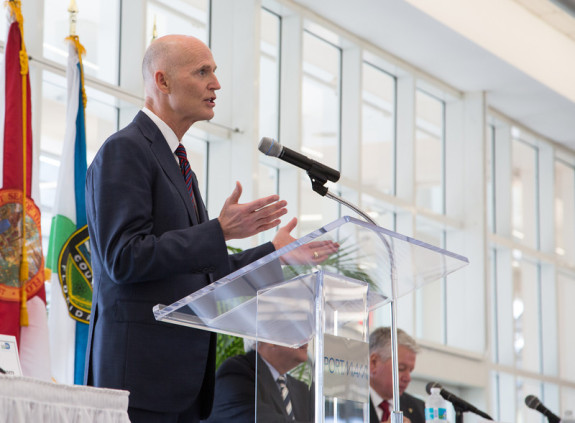By Ashley Lopez
Florida Center for Investigative Reporting
Gov. Rick Scott skipped out on a deposition Friday that is part of a lawsuit concerning his alleged use of private emails and texts to conduct state business. Instead, Scott—who is currently locked in a heated and closely contested re-election bid— attended a fundraiser.
According to The Miami Herald,
Attorney Steven R. Andrews was prepared to put the governor under oath in Tallahassee, but Scott’s communications director, Frank Collins, said Thursday “there is not going to be a deposition tomorrow.” Scott’s lawyers asked the judge to quash the deposition but, as of late Thursday, they hadn’t received an answer.
Scott is instead expected to attend a Friday fundraiser at the Biltmore in Coral Gables, featuring former Gov. Jeb Bush, U.S. Sen. Marco Rubio and Lieutenant Gov. Carlos Lopez Cantera.
However, if the governor is a no-show for a deposition in a case he initiated, it may not be without consequences.
According to California’s rules of civil procedure, the governor must submit to the deposition Friday unless he has received the court’s permission to change the date, said Walter Clark, a trial lawyer who practices in Southern California.
If Scott fails to submit to the deposition, the judge could hold him in contempt and make him pay damages, according to California law.
“You can’t just not show up at a deposition and say we’ll talk about it later,’’ Clark said. “You have to ask a court for relief.”
Scott recently hired an attorney in California to try to protect the private email accounts allegedly used by the governor and his staff to conduct public business.
This past August, a judge ruled Google and Yahoo will have to turn over some information about the private email accounts. The ruling was part of a lawsuit claiming Scott’s administration has been skirting the state’s broad public records laws.
The request for information was limited, however. The judge only sought information about the accounts. He did not require that any person or entity must turn over specific emails.
His staff maintain his presence wasn’t required.
According to The Capitol News Service, “a hearing on the case isn’t scheduled until late November, and the Governor’s people say that’s why Scott didn’t have to show up.”
The News Service also reports Scott “could be held in contempt of court for missing the deposition, but that will be up to the judge overseeing the case.”
Meanwhile, critics took the opportunity to call on the state Legislature to launch an investigation of the private emails.
Creative Loafing in Tampa reported:
“If you have nothing to hide, Rick Scott, then you should have no problem revealing the emails between yourself and your staff,” Pasco County Tax Collector and former GOP state legislator Mike Fasano said at a press conference in Tampa this morning.
Fasano, who is supporting Charlie Crist in the gubernatorial election this fall, called on the governor to come clean today. Instead, the governor blew off the deposition filed by Tallahassee attorney Scott Andrews and opted to attend a fundraiser at the Biltmore with Jeb Bush and Marco Rubio in Coral Gables, risking a contempt of court charge.
“Rick Scott could have come clean today. He had a chance,” said Tampa state Representative Janet Cruz, who joined Fasano in front of the Hillsborough County Courthouse on Pierce Street. The two are calling for an investigation investigation into Scott’s efforts to hide the private email account — gov.rls@gmail.com — which Andrews contends was created to evade the Sunshine Law.
“I believe that it should be the leaders of both chambers and [they should] come up with a select committee,” Fasano said about an investigation. Scott has not denied creating the private gmail account, but he denies that he used it for any rule-breaking of open records laws. But Mike Fasano isn’t so sure.
“Whether a crime has been committed here or not, I don’t know. But what has been committed is not following true to the Sunshine Laws and to our openness here in the state of Florida,” he said, adding that he believes there may have been business that was conducted in those emails that “he may not want to show the state of Florida.”
Whether the GOP-led Legislature would agree to hold a special session to investigate the governor is dubious, and certainly not before a general election taking place in a week and a half.
Florida has some of the most robust public records laws in the country; state officials typically have to turn over any emails concerning state business, regardless of whether they are under public or private accounts. However, Scott has been fighting the release of any information about those email accounts.
Andrews, who has been locked in an ongoing legal battle with Scott involving a land dispute, has said getting courts involved is the only way to get information about what the governor’s office is up to.

